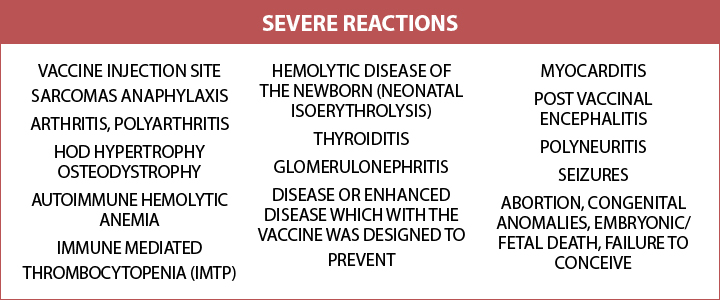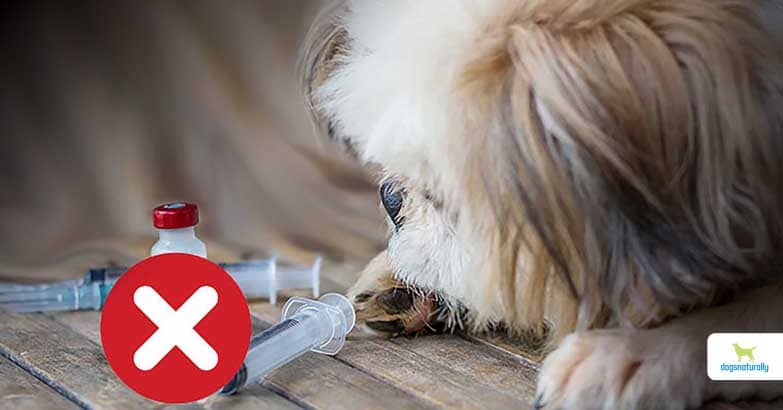Do vaccines really protect your dog?
The answer is yes and no …
But if you don’t know what titer tests are, then the answer is likely yes.
You are hurting your dog with too many vaccines.
Why Over-Vaccination Can Harm Your Dog
Every dog owner fears infectious disease. Parvovirus and distemper can be debilitating and even deadly for your dog.
You want to protect your dog from harm so you give him vaccinations … but you might not know this protection comes at a cost.
Dog vaccinations can often be just as harmful as the disease they’re meant to protect against.
Vaccination can cause a wide range of health problems that range from minor fever to anaphylactic shock and cancer. So it’s vital that we vaccinate our pets only when necessary.
Here are some of the common reactions you might see in your dog, either days or months after vaccination …



These reactions can and do happen every day. So your job is to protect your dog not just from parvo and rabies, but also from cancer, allergies and autoimmune disease.
Let me state this another way …
Vaccination will protect your dog against infectious diseases (in most but not all cases). But vaccination will also increase your dog’s risk of cancer and serious, life threatening autoimmune diseases.
Vaccines can both save lives and take lives.
So the idea is to give as few vaccines as necessary to protect your dog from infectious disease … and hope he doesn’t develop autoimmune disease.
But this isn’t what happens in most vet clinics …
RELATED: Lifelong immunity: Why vets are pushing back …
Why Vets Are Still Over-Vaccinating
Over 20 years ago, a very important research piece was published.
Veterinary immunologist, Dr Ronald Schultz studied every major vaccine in over a thousand dogs … and every study he completed delivered the same conclusion, every time:
“Vaccines for diseases like distemper and canine parvovirus, once administered to adult animals, provide lifetime immunity.”
At the time this study was released, vets were vaccinating dogs and cats every year. Not because they needed annual boosters, but because the makers of those vaccines only tested them for a few months.
Nobody knew how long vaccines really lasted …
But thanks to Dr Schultz’s work, the major veterinary associations finally knew that the core vaccines were extremely likely to protect dogs and cats for life.
They finally knew there was a serious problem with the over-vaccination of dogs.
So in 2003, they changed their revaccination guidelines.
Now this might sound like a great step forward, but there were two problems with this.
First, the AAHA and AVMA only changed their recommendations from annual vaccination to every three years.
Dr Richard Ford, Professor of Medicine, North Carolina State University, a member of the AAHA task force, said this was just a compromise. “It’s completely arbitrary … I will say there is no science behind the three-year recommendation…”
Over the years, more and more Vaccination Guidelines have been released by the AAHA, but each time they really didn’t budge all that much on the arbitrary (and excessive) recommendation of every three years.
Was 2017 The Year For Change?
Nope. The most recent 2017 Canine Vaccination Guidelines were no different.
Vets are still sticking to the three year interval.
Despite research that has repeatedly shown this is an excessive and dangerous practice.
The problem with the AAHA’s overly aggressive vaccination schedule is compounded because the vaccination guidelines are merely recommendations.
This means vets can also ignore research and safety and vaccinate whenever they feel like it.
And according to a major vaccine manufacturer, they do.
They say a whopping 60 percent of vets still vaccinate every year.
Vaccines add up to 14 percent of the average practice’s income the AAHA reports. And veterinarians stand to lose big.
I suspect some are ignoring my work,” says Schultz. “Tying vaccinations into the annual visit became prominent in the 1980s and a way of practicing in the 1990s. Now veterinarians don’t want to give it up.”
This is bad news. Most vets are either unaware or unwilling to vaccinate based on research.
And your dog pays the price, not your vet.
But it’s not all doom and gloom …
There’s one change to the 2017 Canine Vaccination Guidelines that you absolutely need to understand and follow through on …
Titer Testing: Putting Science Behind Vaccination
Until recently, vaccine schedules were based on nothing more than speculation.
This simple blood test, called a titer, can tell if your dog is protected or whether he actually needs another vaccine.
Sadly, very few vets and dog owners are using this life-saving tool.
And this baffles me …
Why are vets so quick to give your dog life-saving vaccines, but not life-saving titer tests?
Another problem that’s been recently solved is cost and convenience.
Titers were expensive and you didn’t get results right away. Vets had to draw the blood and send it to a lab first. Maybe that’s why vets haven’t been offering this life-saving tool and have just been giving vaccines instead.
But now that’s all changed. You and your vet can finally put an end to dangerous and unscientific vaccine schedules.
Here’s how …
In-House Titer Testing
There are two in-house titer tests that are available to vets. This means the test is done right in your vet’s clinic and you get quick results.
TiterCHEK and Vaccicheck are the two simple tests your vet can do right in his clinic, for about the same amount of money as a vaccine.
Unfortunately, just as vets are slow to change their vaccine schedules, they’re slow to start using titer tests. These in-house tests have been available for some years now … but many vets still don’t use them. Some vets prefer to just give the vaccine … but that one vaccine could be the one to cause serious and irreparable damage to your dog.
You have a choice as the owner of your dog. You can choose to allow your vet to over-vaccinate your dog or you can choose to protect him and ask for a titer test instead. Which takes me back to the beginning …
In January 2015, Dr Richard Ford delivered a lecture on titer tests at the NAVC. It was so popular, over 400 vets were lined up out the door to get in.
There are vets who care about over-vaccination and the damage it can cause. We should support these vets. And you need to do your part too. And your part is the most important, so listen carefully …
These 400 vets will only use titer tests if you ask for them.
If you’ve read this far, don’t let this time go to waste. Ask your vet for a titer test in lieu of your pet’s next vaccine.
If your vet doesn’t want to do a titer test, move on to a vet who is willing to go the extra mile to protect your dog from harm. A vet who cares about the over-vaccination of dogs.
Your dog deserves nothing less.















